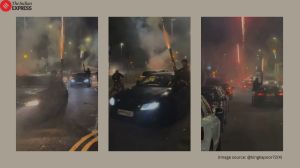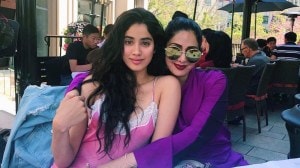Bittersweet memories in Husain town
They were born in the same house,some eight-odd years apart.
They were born in the same house,some eight-odd years apart. Yet,Qutubaddin Sarafuddins life in Pandharpur could not be more different from the one lived by his illustrious cousin M F Husain. At 87,Sarafuddin still cycles every day from his ramshackle home to his tiny kirana shop,where he spends the rest of the day measuring out rice,wheat and oil for customers.
Thursday,the day Husain died in London,was no different. I got the news at about 8.30 am. I was deeply saddened after all we have the same blood,although we met just once or twice. But then I was back at my shop as usual, says Sarafuddin,whose mother and Husains mother were sisters.
No neighbours have dropped by to offer condolences,he says. The family had been busy with the engagement of Sarafuddins grand-daughter,which took place on Friday.
Sarafuddin and his family are the only tangible links between Husain and his place of birth. Husain left Pandharpur when he was four years old,returning just once,in November 1995,to receive the community Pandharpur Bhushan Puraskar. He visited his cousins home,inquired about his mothers tomb,visited the Vithal-Rukmini temple,painted his muse Madhuri Dixit on the side of a bull,and left.
We have never asked him for any help. Why should we? He too never offered anything. He came for my daughters wedding in Mumbai and became sentimental,but did not really keep in touch. He was a very big man,we are poor people, says Sarafuddin.
He shows the adjoining wada where Husain and he were born,which is now in a shambles. Everyone says he was born in some zaari wada,but thats wrong. This was the place, he says,tears in his eyes.
Sarafuddins oscillation between attachment and detachment for Husain is typical of the town as a whole,not many of whose 99,000 residents knew,until he visited in 1995,that this was the acclaimed painters birthplace.
But Pandharpur has other claims to fame. It is one of Maharashtras most popular religious destinations,and hosts lakhs of pilgrims every year. We sell prasad worth Rs 50,000 per day, says Vithal Jadhav of Jadhavbandhu Pedewale,located in the Vithal temple complex.
During his visit to the temple,Husain left behind a canvas. It took him 15 minutes. I asked him to make a painting on the wall of the temple like the one of the Rukmini Swayamvar,but he said that was a different style and he wouldnt be able to match that. He did the canvas instead,and we display it on special occasions, says chief priest V N Utpat.
Husain had come to a exhibition that we held in Mumbai, says Bharat Gadhge,art teacher at the Lokmanya Vidyalaya. After seeing a painting by me and learning I was from Pandharpur,he invited me home and gifted me a small canvas. Ghadge has even framed the hanky that he gave Husain to wipe his brush with after he had painted the canvas at the temple complex.
But not everyone was a fan. Journalist-turned-teacher D V Warkhedkar lodged a police case against Husain in 2004. The canvases were blasphemous and hurt our sentiments,hence I moved court. Now,that he is no more,the case shall rest. But if there had been any move to bring his remains to Pandharpur,as suggested by Raj Thackeray,we would have definitely opposed it, he says.
Adds agriculturalist Rahul Patwardhan,Why do you think people here dont talk much about him? Its because of these paintings. He had no sentiments for his country it shows in the fact that he has done nothing for this town or even his cousin who lives in such a pathetic condition.
But Utpat has the last word: Whatever it may be,we cannot forget that because of him,Pandharpur is known to the rest of the world. The son of the soil has paid his dues.





- 01
- 02
- 03
- 04
- 05


























